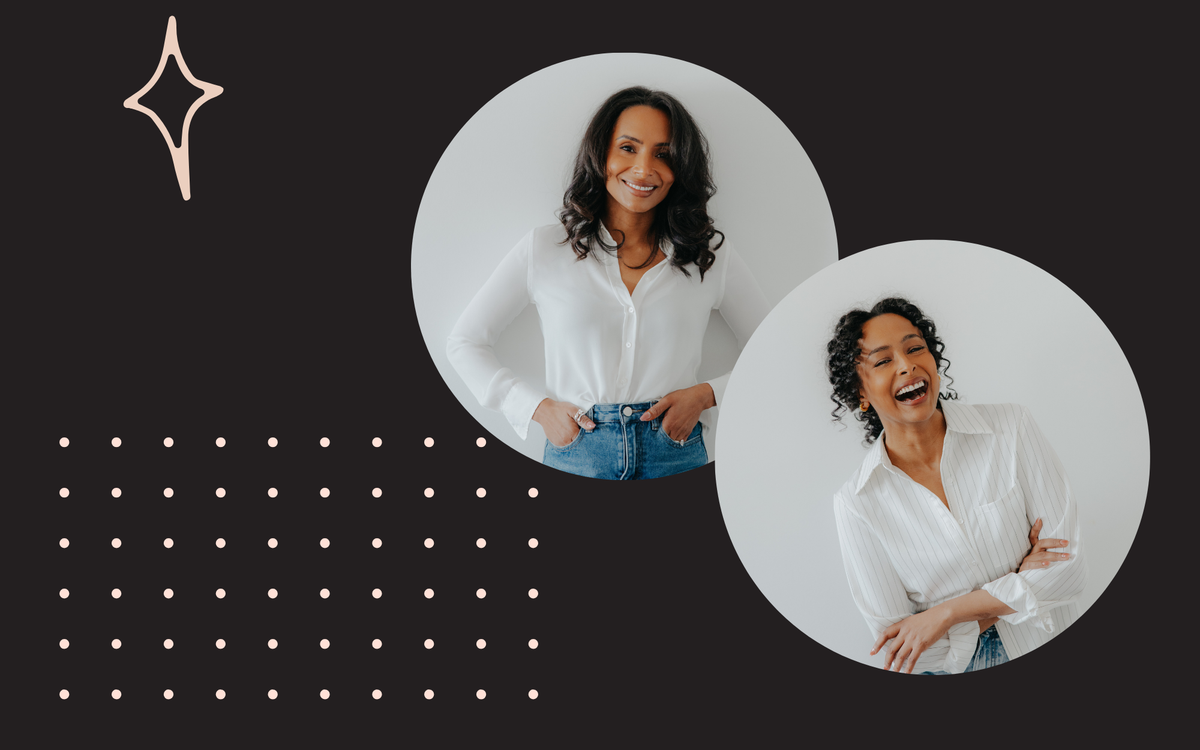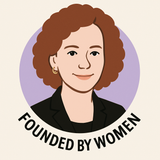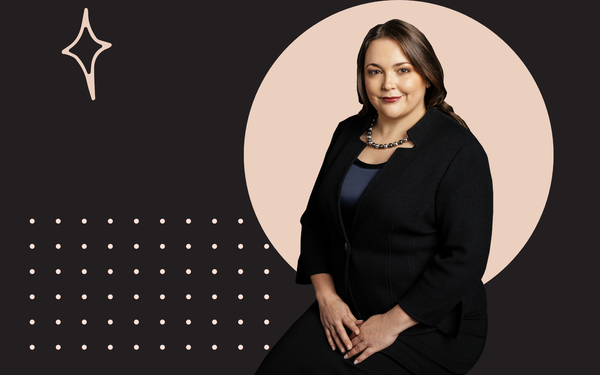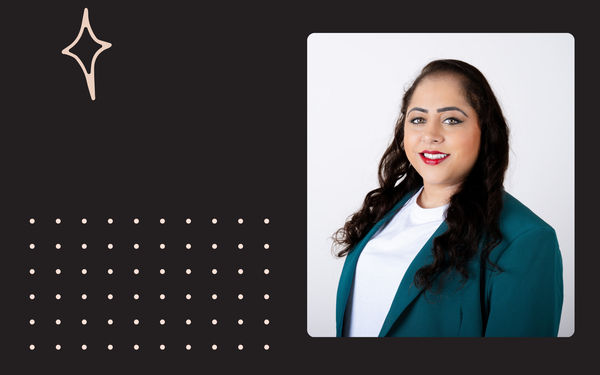Sister Act: How Lina and Manar El Mugammar Turned Personal Hair Frustrations into Knotless, a Beauty-Tech Solution for the $10 Billion Textured Hair Market

Every woman with textured hair knows the anxiety of a new salon appointment. The uncertainty of whether your stylist will understand your hair, the disappointment when they don't, and the exhausting cycle of searching for someone who truly gets it. For sisters Lina and Manar, this frustration became the foundation for something much bigger.
Lina, an accomplished attorney with a background in fine arts and intellectual property law, had always loved her natural hair but dreaded the guessing game of finding stylists who could care for it properly. Meanwhile, Manar, a digital marketing strategist who started braiding hair at 14, could see this wasn't just a personal problem but a massive operational gap in an underserved industry.
Their solution? Knotless, a beauty-tech marketplace that's tackling the $10 billion global textured hair market by creating the infrastructure of trust and accessibility that has long been missing. Based in Toronto, the platform goes beyond simple stylist booking to address the deeper cultural and systemic barriers that have left Black patrons feeling unseen in the beauty industry.
What makes their story particularly compelling is how their different professional backgrounds complement each other. Lina brings the creative vision and legal framework needed to build something that lasts, while Manar contributes the digital strategy and community-building expertise essential for scaling a tech platform. But perhaps most importantly, they both bring the lived experience of navigating textured hair care in a system that wasn't built for them.
Knotless isn't just about connecting clients with stylists. It's about creating a community space powered by technology, complete with filters for gender-affirming care, sensory-friendly environments, religious privacy, and disability access. The platform features verified stylist profiles, transparent reviews, and community-driven recommendations designed to bridge the digital trust gap that makes beauty services so personal.
In this conversation, the sisters share how they turned family dynamics into a business strength, the challenges of building cultural authenticity into a scalable tech platform, and their advice for other women considering launching a business with their closest family members while serving a community they deeply care about.
1. What was the moment you realized that the frustration of finding trusted stylists for textured hair wasn’t just a personal problem but a systemic industry gap worth leveraging your established careers to solve?
Lina: It really started as a personal pain point. I’ve always loved my natural hair, but finding a stylist who could actually care for it and do it well—consistently—felt impossible. Every appointment was like rolling the dice. The more I talked to other women about it, the more I realized it wasn’t just my experience; it was systemic. There was no infrastructure of trust or accessibility for people with textured hair. Knotless was born out of that frustration, but also from a lot of love: love for our community, our culture, and the beauty of our hair when it’s properly cared for.
Manar: I could also see how much of it came down to a lack of systems. My brain immediately went, “This isn’t a one-person problem: it’s an operational gap in a massive, underserved industry.” With my process background, I wanted to help turn what started as a personal pain point into a scalable, trusted system: one that gives stylists the tools they need to run successful businesses and gives clients peace of mind.
2. How did your different professional backgrounds in law and digital marketing complement each other in building Knotless—not just as a marketplace, but as a beauty-tech company setting new professional standards?
Manar: Honestly, it’s been such a natural blend of who we are. My background is in digital marketing and business strategy. I started my very first “business” braiding hair at age 14. So, when it came time to build Knotless, I understood both sides: the lived experience of trying to find and book the right stylist, and the business side of bringing this idea to life. For me, community-building and influencer partnerships are huge; those are the strategies that will really make Knotless stand out. It’s not just about connecting people to stylists but also about creating a trusted and vibrant community that celebrates Black beauty.
Lina: My journey has always had this creative undercurrent. I actually studied fine arts before law, so I’ve always been drawn to the intersection of beauty, culture, and storytelling. Working in intellectual property law gave me a deep respect for structure, for protecting ideas and building things that last—but it also made me realize how creativity and culture can get boxed in by systems that aren’t built for us.
With Knotless, I get to blend both sides of myself, the creative and the analytical. It’s an opportunity to design something that celebrates Black beauty in all its forms while still being built on strong, thoughtful foundations. I like to think of it as bringing artistry and advocacy into tech: building something beautiful that’s also built to last.
3. Knotless is tackling a $10 billion global industry while solving a deeply personal problem. How do you balance building a scalable tech platform with keeping the experience culturally authentic for Black patrons? And what have been the biggest challenges in building trust between clients and stylists in a digital marketplace?
For us, scalability and cultural authenticity go hand in hand; you can’t have one without the other. Knotless was born from our lived experiences, so ensuring that Black patrons feel seen, respected, and celebrated isn’t an “add-on” but the literal foundation of the platform.
On the tech side, we’re building with scale in mind, so we never lose sight of the details that matter: filters for gender-affirming care, sensory-friendly spaces, religious privacy, and disability access. Those are what make Knotless resonate culturally. The challenge isn’t just solving how to book better hair appointments; it’s also about belonging in an industry that hasn’t always prioritized textured hair.
The biggest challenge has been trust. In beauty, trust is everything: it’s your crown, your identity. People want to know they’re in safe hands. To bridge that digital gap, we’ve built in transparency: verified stylist profiles, reviews, and community-driven recommendations. We also highlight stylists’ specialties so clients know they’re booking someone who gets their hair and their needs.
It’s definitely a balancing act, but we see Knotless as more than a marketplace. It’s a community space powered by technology. And that balance is what makes it both scalable and deeply personal.
4. As sisters and co-founders, how has your relationship shaped the way you build Knotless—and how do you turn family dynamics into a strength in business?
Being sisters is honestly our superpower. We grew up navigating the same challenges around Black hair care, so there’s this built-in understanding of why Knotless matters. That shared experience keeps us grounded and aligned on the bigger picture, even when the day-to-day of running a startup gets intense.
Of course, we don’t always agree. Case in point: when we were first brainstorming Knotless branding, Lina wanted fun and vibrant, and I was pushing for sleek and minimal. Let’s just say that debate lasted days, but it forced us to blend both perspectives and land on something stronger than either of us had imagined. That’s the magic of working with your sister: you can disagree passionately, then laugh about it five minutes later.
Ultimately, what makes our dynamic work is that when you know someone has your back unconditionally, you can move faster, take bigger risks, and have the hard conversations without worrying about the foundation crumbling. That’s rare in business partnerships, and it’s something we don’t take for granted.
5. What advice would you give to other women—especially sisters or close friends—who are considering starting a business together about maintaining both a healthy partnership and a healthy personal relationship, while also building something that serves their community?
Our biggest advice is to treat the business relationship with as much care as you treat the personal one. When you’re building with a sister or a close friend, it’s easy to blur the lines. One minute you’re talking strategy, the next you’re debating what to order for dinner. That closeness is a strength, but it also means you need clear boundaries.
For us, it comes down to communication and respect. We don’t assume we’re on the same page just because we’re family; we actually sit down, set expectations, and talk things through like any other co-founders would. And when we disagree (because we definitely do!), we try to approach it with curiosity rather than defensiveness.
The other piece is remembering that your relationship is bigger than the business. Sometimes that means carving out time to just be sisters and laugh about something unrelated to Knotless. That balance keeps things joyful, and joy is fuel when you’re serving a community you care about.
Lastly, be clear on your shared values. Our north stars are community, inclusivity, and exceptional hair care. When we hit tough moments, we come back to those values, and it helps us move forward without losing sight of why we started in the first place.
Are you a woman leader with an inspiring journey to tell? Founded by Women is on a mission to elevate and amplify the voices of women making an impact.
If you're breaking barriers, driving change, or paving the way for others, we’d love to feature your story. Get in touch with us today!
👉 hi@foundedbywomen.org


